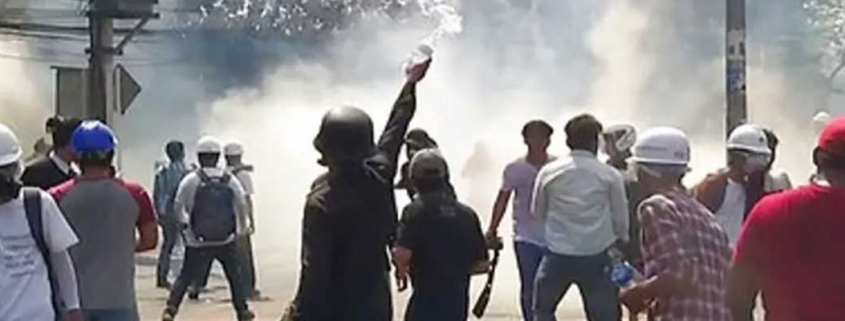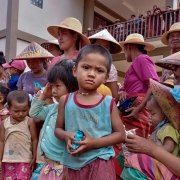At least 18 dead, says UN human rights office, as Myanmar police crack down on protests for the second day
Myanmar police fired on protests around the country on Sunday (Feb 28) in the bloodiest day of weeks of demonstrations against a military coup and at least 18 people were killed, the UN human rights office said.
Rescue workers told AFP that three men had been shot dead in southern Dawei city, while another two teenagers were killed in the town of Bago.
A sixth person died in Yangon, a lawmaker from Myanmar’s ousted civilian government said in a Facebook post.
Myanmar has been in chaos since the army seized power and detained elected government leader Aung San Suu Kyi and much of her party leadership on Feb 1, alleging fraud in a November election her party won in a landslide.
The coup, which brought a halt to tentative steps towards democracy after nearly 50 years of military rule, has drawn hundreds of thousands onto the streets and the condemnation of Western countries.
“Myanmar is like a battlefield,” the Buddhist-majority country’s first Catholic cardinal, Charles Maung Bo, said on Twitter.
Police were out in force early and opened fire in different parts of the biggest city of Yangon after stun grenades, tear gas and shots in the air failed to break up crowds. Soldiers also reinforced police, Reuters reported.
Several wounded people were hauled away by fellow protesters, leaving bloody smears on pavements, media images showed. One man died after being brought to a hospital with a bullet in the chest, said a doctor who asked not to be identified.
“Police and military forces have confronted peaceful demonstrations, using lethal force and less-than-lethal force that – according to credible information received by the UN Human Rights Office – has left at least 18 people dead and over 30 wounded,” the UN office said.
“Deaths reportedly occurred as a result of live ammunition fired into crowds in Yangon, Dawei, Mandalay, Myeik, Bago and Pokokku. Tear gas was also reportedly used in various locations as well as flash-bang and stun grenades.”
Among the dead were three people in Dawei in the south, politician Kyaw Min Htike told Reuters from the town.
The Myanmar Now media outlet reported two people had been killed in a protest in the second city of Mandalay. Security forces fired again later in the day and one woman was killed, Mandalay resident Sai Tun told Reuters.
“The medical team checked her and confirmed she didn’t make it. She was shot in the head,” Sai Tun said.
READ: Myanmar’s UN ambassador vows to continue fighting after junta fires him
Police and the spokesman for the ruling military council did not respond to phone calls seeking comment.
The dead in Yangon included a teacher, Tin New Yee, who died after police swooped to disperse a teachers’ protest with stun grenades, sending the crowd fleeing, her daughter and a fellow teacher said.
Police also hurled stun grenades outside a Yangon medical school, sending doctors and students in white lab coats scattering. A group called the Whitecoat Alliance of medics said more than 50 medical staff had been arrested.
Police broke up protests in other towns, including Lashio in the northeast, Myeik in the deep south and Hpa-An in the east, residents and media said.
“NEVER KNEEL”
Junta leader General Min Aung Hlaing said last week authorities were using minimal force to deal with the protests.
Nevertheless, at least 21 protesters have now died in the turmoil, Reuters reported. The army said a policeman has been killed.
The crackdown would appear to indicate determination by the military to impose its authority in the face of widespread defiance, not just on the streets but more broadly in the civil service, municipal administration, the judiciary, the education and health sectors and the media.
The crackdown would appear to indicate determination by the military to impose its authority in the face of defiance, not just on the streets but more broadly in the civil service, municipal administration, the judiciary, the education and health sectors and the media.
“The Myanmar security forces’ clear escalation in use of lethal force in multiple towns and cities … is outrageous and unacceptable,” Phil Robertson, deputy Asia director of New York-based Human Rights Watch, said in a statement.
The Canadian Embassy said it was “appalled by a trend of increased violence and use of force against protesters” and Indonesia, which has taken the lead within the Association of Southeast Asian Nations (ASEAN) in efforts to resolve the turmoil, said it was deeply concerned.
“The people of Myanmar have the right to assemble peacefully and demand the restoration of democracy,” Ravina Shamdasani, spokeswoman for the UN Office of the High Commissioner for Human Rights, said.
“These fundamental rights must be respected by the military and police, not met with violent and bloody repression.”
The office of UN human rights chief Michelle Bachelet also reiterated a call for the immediate release of all those arbitrarily detained, including members of the elected government.
“The police and security forces have targeted an ever-increasing number of opposition voices and demonstrators by arresting political officials, activists, civil society members, journalists and medical professionals,” said Shamdasani.
“Today alone, police have detained at least 85 medical professionals and students, as well as seven journalists, who were present at the demonstrations.
“Over 1,000 individuals have been arbitrarily arrested and detained in the last month – some of whom remain unaccounted for – mostly without any form of due process, simply for exercising their human rights to freedom of opinion, expression and peaceful assembly.
“The international community must stand in solidarity with the protesters and all those seeking a return to democracy in Myanmar.”
A UN spokesman said on Sunday that Secretary-General Antonio Guterres strongly condemns the violent crackdown in Myanmar and is deeply disturbed by the increase in deaths and injuries.
“The use of lethal force against peaceful protestors and arbitrary arrests are unacceptable,” UN spokesman Stephane Dujarric said in a statement.
“The Secretary-General urges the international community to come together and send a clear signal to the military that it must respect the will of the people of Myanmar as expressed through the election and stop the repression,” Dujarric said.
State-run MRTV television said more than 470 people had been arrested on Saturday when police launched the nationwide crackdown. It was not clear how many were detained on Sunday.
“INSTIL FEAR”
Youth activist Esther Ze Naw said people were battling the fear they had lived with under military rule.
“It’s obvious they’re trying to instil fear in us by making us run and hide,” she said. “We can’t accept that.”
State television announced on Saturday that Myanmar’s UN envoy has been fired for betraying the country, after he urged the United Nations to use “any means necessary” to reverse the coup.
The ambassador, Kyaw Moe Tun, remained defiant. “I decided to fight back as long as I can,” he told Reuters in New York.
While Western countries have condemned the coup and some have imposed limited sanctions, the generals have traditionally shrugged off diplomatic pressure. They have promised to hold a new election but not set a date.
Suu Kyi’s party and supporters said the result of the November vote must be respected.
Suu Kyi, 75, who spent nearly 15 years under house arrest, faces charges of illegally importing six walkie-talkie radios and of violating a natural disaster law by breaching coronavirus protocols. The next hearing in her case is on Monday.
Source: Reuters




